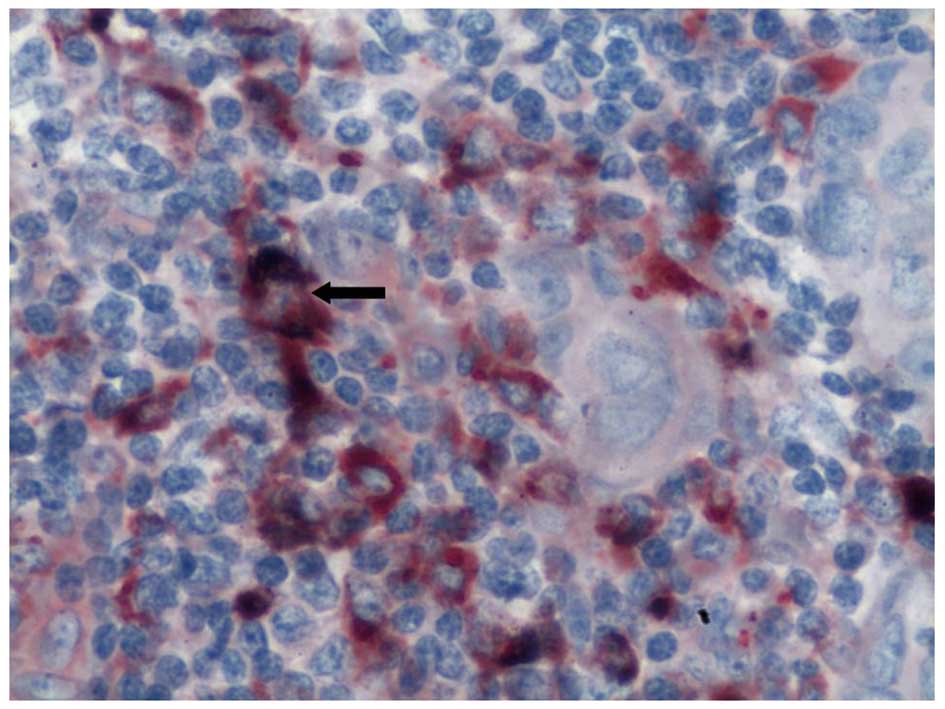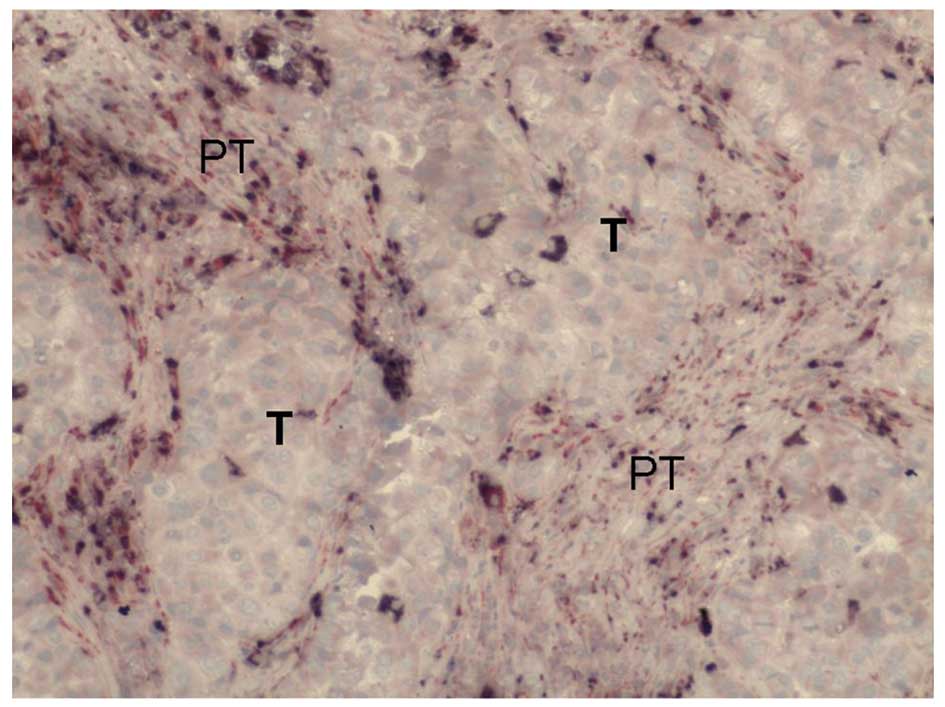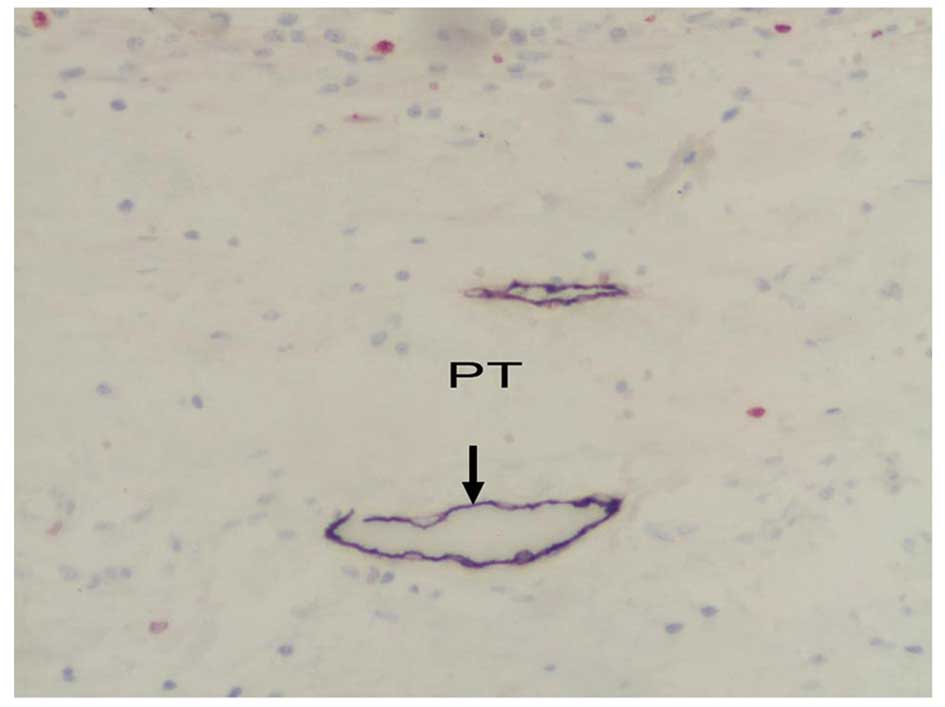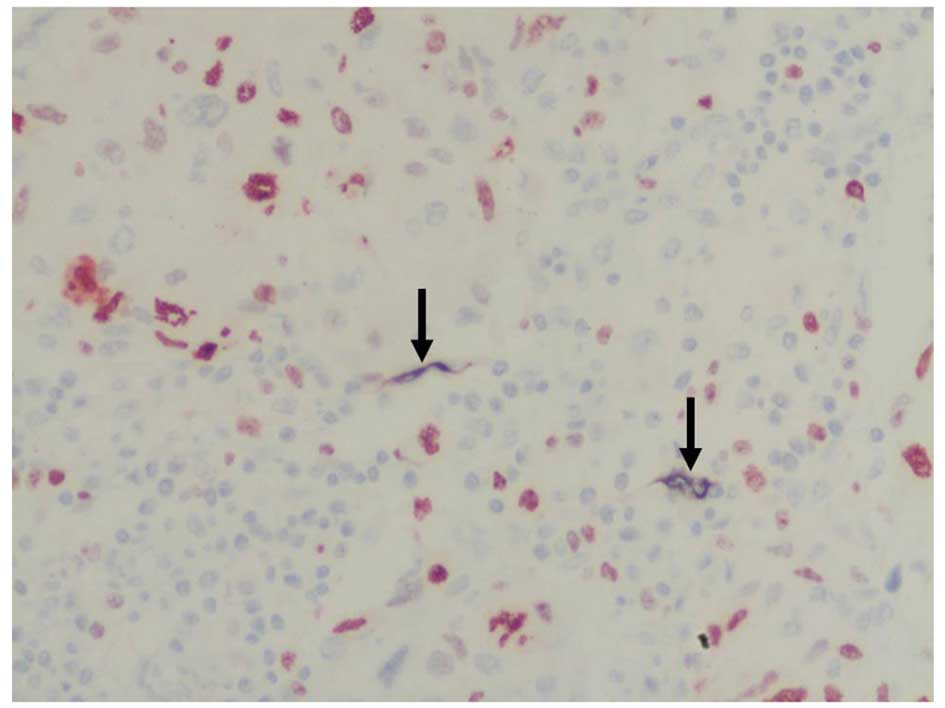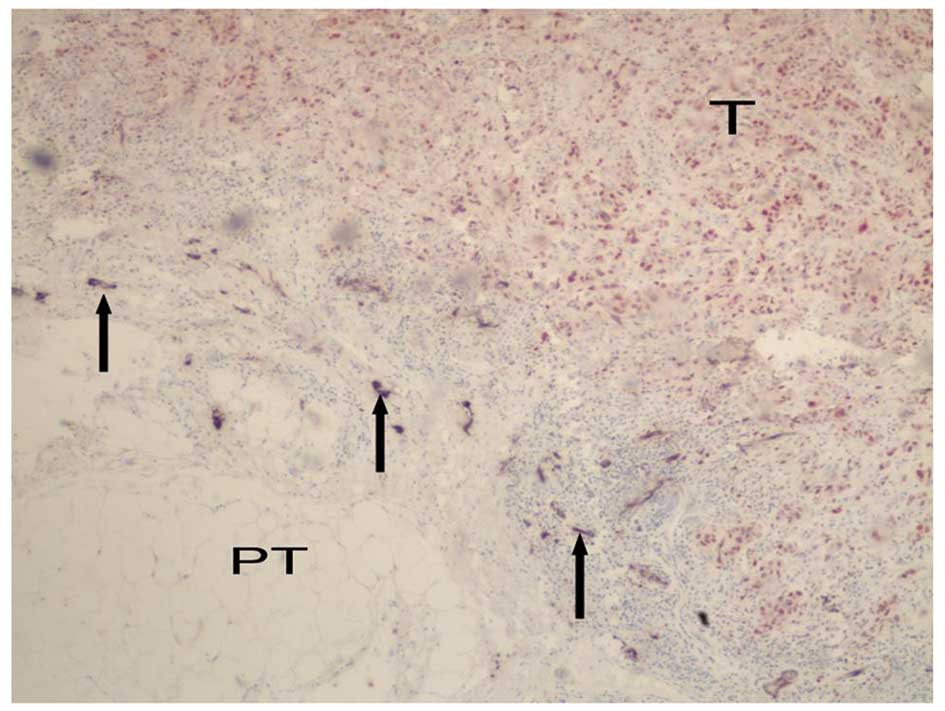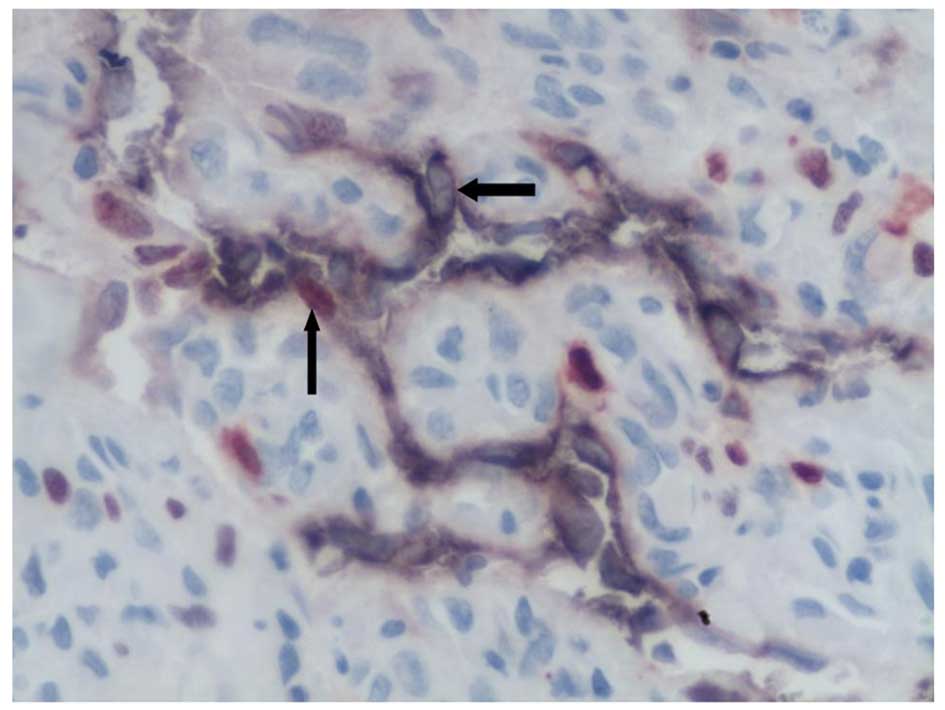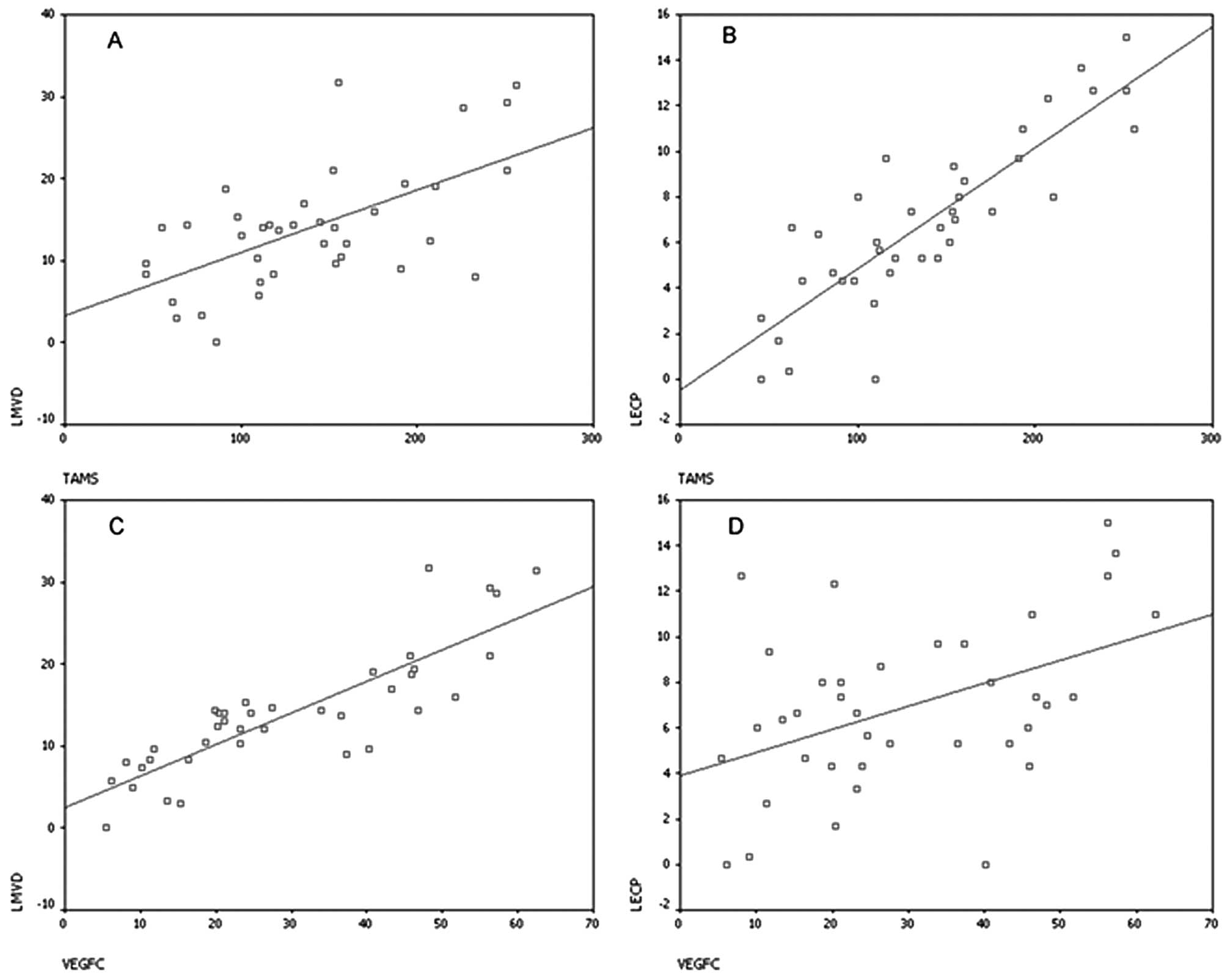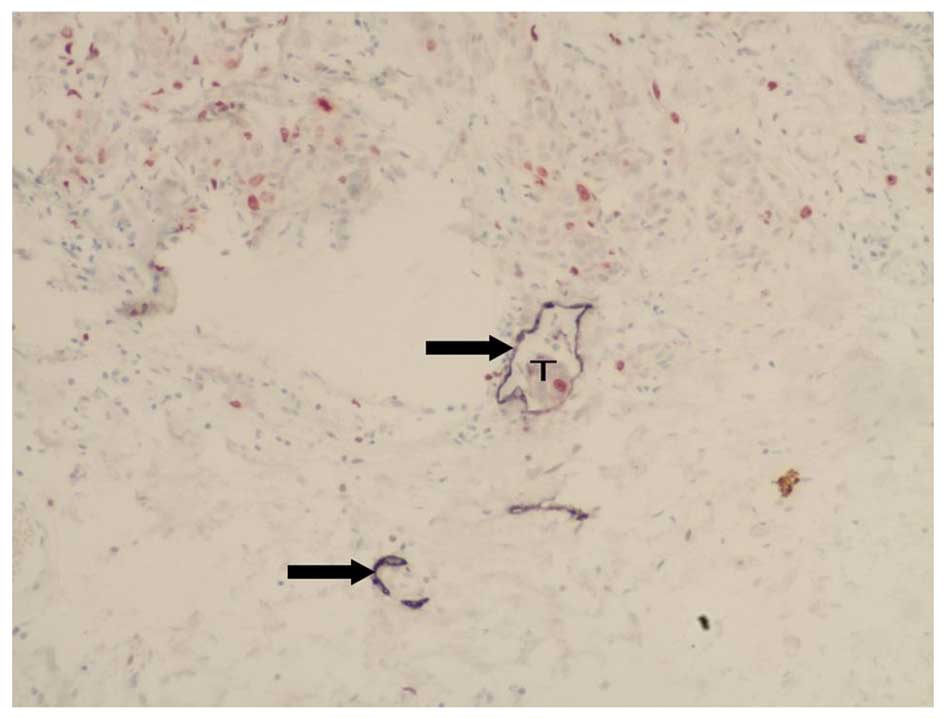|
1
|
Sleeman JP and Thiele W: Tumor metastasis
and the lymphatic vasculature. Int J Cancer. 125:2747–2756.
2009.PubMed/NCBI
|
|
2
|
Achen MG and Stacker SA: Molecular control
of lymphatic metastasis. Ann N Y Acad Sci. 1131:225–234. 2008.
|
|
3
|
Schoppmann SF, Birner P, Stockl J, et al:
Tumor-associated macrophages express lymphatic endothelial growth
factors and are related to peritumoral lymphangiogenesis. Am J
Pathol. 161:947–956. 2002.
|
|
4
|
Zhang B, Wang J, Gao J, et al:
Alternatively activated RAW264.7 macrophages enhance tumor
lymphangiogenesis in mouse lung adenocarcinoma. J Cell Biochem.
107:134–143. 2009.
|
|
5
|
Moussai D, Mitsui H, Pettersen JS, et al:
The human cutaneous squamous cell carcinoma microenvironment is
characterized by increased lymphatic density and enhanced
expression of macrophage-derived VEGF-C. J Invest Dermatol.
131:229–236. 2011.PubMed/NCBI
|
|
6
|
Sundar SS and Ganesan TS: Role of
lymphangiogenesis in cancer. J Clin Oncol. 25:4298–4307. 2007.
View Article : Google Scholar
|
|
7
|
Kerjaschki D: The crucial role of
macrophages in lymphangiogenesis. J Clin Invest. 115:2316–2319.
2005.
|
|
8
|
Schoppmann SF, Fenzl A, Nagy K, et al:
VEGF-C expressing tumor-associated macrophages in lymph node
positive breast cancer: impact on lymphangiogenesis and survival.
Surgery. 139:839–846. 2006.
|
|
9
|
Van der Auwera I, Van den Eynden GG,
Colpaert CG, et al: Tumor lymphangiogenesis in inflammatory breast
carcinoma: a histomorphometric study. Clin Cancer Res.
11:7637–7642. 2005.
|
|
10
|
Omachi T, Kawai Y, Mizuno R, et al:
Immunohistochemical demonstration of proliferating lymphatic
vessels in colorectal carcinoma and its clinicopathological
significance. Cancer Lett. 246:167–172. 2007.
|
|
11
|
Arnaout-Alkarain A, Kahn HJ, Narod SA, Sun
PA and Marks AN: Significance of lymph vessel invasion identified
by the endothelial lymphatic marker D2-40 in node negative breast
cancer. Mod Pathol. 20:183–191. 2007.PubMed/NCBI
|
|
12
|
Solinas G, Germano G, Mantovani A and
Allavena P: Tumor-associated macrophages (TAM) as major players of
the cancer-related inflammation. J Leukoc Biol. 86:1065–1073.
2009.
|
|
13
|
Knowles HJ and Harris AL: Macrophages and
the hypoxic tumour microenvironment. Front Biosci. 12:4298–4314.
2007. View Article : Google Scholar : PubMed/NCBI
|
|
14
|
Massi D, Puig S, Franchi A, et al: Tumour
lymphangiogenesis is a possible predictor of sentinel lymph node
status in cutaneous melanoma: a case-control study. J Clin Pathol.
59:166–173. 2006. View Article : Google Scholar : PubMed/NCBI
|
|
15
|
Fernandez MI, Bolenz C, Trojan L, et al:
Prognostic implications of lymphangiogenesis in muscle-invasive
transitional cell carcinoma of the bladder. Eur Urol. 53:571–578.
2008. View Article : Google Scholar : PubMed/NCBI
|
|
16
|
Trojan L, Rensch F, Voss M, et al: The
role of the lymphatic system and its specific growth factor,
vascular endothelial growth factor C, for lymphogenic metastasis in
prostate cancer. BJU Int. 98:903–906. 2006. View Article : Google Scholar : PubMed/NCBI
|
|
17
|
Aishima S, Nishihara Y, Iguchi T, et al:
Lymphatic spread is related to VEGF-C expression and D2-40-positive
myofibroblasts in intrahepatic cholangiocarcinoma. Mod Pathol.
21:256–264. 2008. View Article : Google Scholar : PubMed/NCBI
|
|
18
|
Schoppmann SF, Bayer G, Aumayr K, et al:
Prognostic value of lymphangiogenesis and lymphovascular invasion
in invasive breast cancer. Ann Surg. 240:306–312. 2004. View Article : Google Scholar : PubMed/NCBI
|
|
19
|
Van den Eynden GG, Van der Auwera I, Van
Laere SJ, et al: Comparison of molecular determinants of
angiogenesis and lymphangiogenesis in lymph node metastases and in
primary tumours of patients with breast cancer. J Pathol.
213:56–64. 2007.PubMed/NCBI
|
|
20
|
Krishnan J, Kirkin V, Steffen A, et al:
Differential in vivo and in vitro expression of vascular
endothelial growth factor (VEGF)-C and VEGF-D in tumors and its
relationship to lymphatic metastasis in immunocompetent rats.
Cancer Res. 63:713–722. 2003.PubMed/NCBI
|
|
21
|
Wissmann C and Detmar M: Pathways
targeting tumor lymphangiogenesis. Clin Cancer Res. 12:6865–6868.
2006. View Article : Google Scholar : PubMed/NCBI
|
|
22
|
Su JL, Yen CJ, Chen PS, et al: The role of
the VEGF-C/VEGFR-3 axis in cancer progression. Br J Cancer.
96:541–545. 2007. View Article : Google Scholar : PubMed/NCBI
|
|
23
|
Sica A, Schioppa T, Mantovani A and
Allavena P: Tumour-associated macrophages are a distinct M2
polarised population promoting tumour progression: potential
targets of anti-cancer therapy. Eur J Cancer. 42:717–727. 2006.
View Article : Google Scholar
|
|
24
|
Royston D and Jackson DG: Mechanisms of
lymphatic metastasis in human colorectal adenocarcinoma. J Pathol.
217:608–619. 2009. View Article : Google Scholar : PubMed/NCBI
|
|
25
|
He Y, Karpanen T and Alitalo K: Role of
lymphangiogenic factors in tumor metastasis. Biochim Biophys Acta.
1654:3–12. 2004.PubMed/NCBI
|
|
26
|
He Y, Rajantie I, Pajusola K, et al:
Vascular endothelial cell growth factor receptor 3-mediated
activation of lymphatic endothelium is crucial for tumor cell entry
and spread via lymphatic vessels. Cancer Res. 65:4739–4746. 2005.
View Article : Google Scholar : PubMed/NCBI
|
|
27
|
Zhang XH, Huang DP, Guo GL, et al:
Coexpression of VEGF-C and COX-2 and its association with
lymphangiogenesis in human breast cancer. BMC Cancer. 8:42008.
View Article : Google Scholar : PubMed/NCBI
|
|
28
|
Wang XL, Fang JP, Tang RY and Chen XM:
Different significance between intratumoral and peritumoral
lymphatic vessel density in gastric cancer: a retrospective study
of 123 cases. BMC Cancer. 10:2992010.PubMed/NCBI
|
|
29
|
Botting SK, Fouad H, Elwell K, et al:
Prognostic significance of peritumoral lymphatic vessel density and
vascular endothelial growth factor receptor 3 in invasive squamous
cell cervical cancer. Transl Oncol. 3:170–175. 2010. View Article : Google Scholar
|















